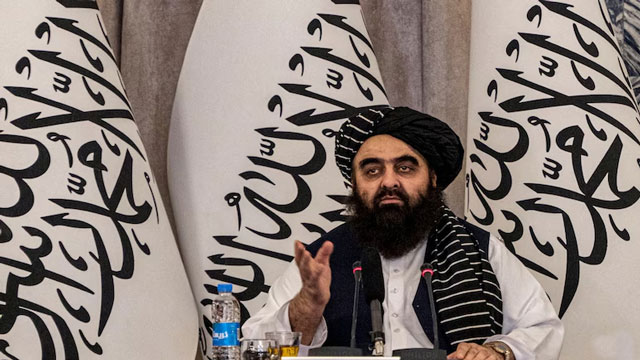Daijiworld Media Network – New Delhi
New Delhi, Oct 9: In a significant diplomatic development, Afghanistan’s UN-sanctioned Foreign Minister Amir Khan Muttaqi has arrived in India for a week-long visit — marking the first visit by a senior Taliban leader since the group regained power in 2021 following the withdrawal of US-led forces.
Muttaqi, who was granted a special travel waiver by the UN Security Council, is expected to meet External Affairs Minister S. Jaishankar and National Security Advisor Ajit Doval during his stay. His visit comes at a time when New Delhi seeks to carefully recalibrate its engagement with the Taliban government amid shifting regional dynamics.

However, even before the formal talks begin, the visit has presented a unique diplomatic dilemma for India — the flag protocol. Traditionally, India places its tricolour alongside that of the visiting nation during official meetings and photo opportunities. But since India has not officially recognised the Taliban regime, it has not accorded official status to the Taliban’s white flag bearing the Islamic declaration of faith.
The Afghan Embassy in New Delhi continues to fly the tricolour of the former Islamic Republic of Afghanistan, led by ousted President Ashraf Ghani. During previous informal meetings between Indian and Taliban officials — including one in Dubai earlier this year — both sides avoided displaying any flag to sidestep controversy. However, with the high-profile meetings scheduled to take place in New Delhi this time, the issue has re-emerged as a diplomatic tightrope.
Historically, India and Afghanistan shared close relations, but New Delhi shut down its embassy in Kabul after the Taliban takeover in 2021. A limited diplomatic presence was later re-established to facilitate trade, humanitarian assistance, and medical cooperation. While India has not formally recognised the Taliban administration, it has gradually opened channels of communication through discreet diplomatic interactions.
Muttaqi’s visit is viewed as an important step in shaping the future of Indo-Afghan engagement. It comes days after India joined Russia, China, and other regional players in opposing any foreign military infrastructure in Afghanistan, amid growing strategic concerns over the country’s stability.
India has repeatedly maintained that Afghan soil must not be used for terrorist activities against any country. The latest outreach, following Muttaqi’s phone conversation with External Affairs Minister Jaishankar in May, is seen as a cautious yet pragmatic attempt by New Delhi to engage with the regime in Kabul while safeguarding its strategic and security interests.